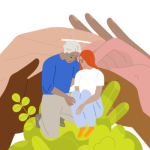Talk About Mental Health: For Young People Looking for Help
 Mental health problems don’t only affect adults. Children, teens and young adults can have mental health problems, too. In fact, three out of four people with mental health problems showed signs before they were 24 years old.
Mental health problems don’t only affect adults. Children, teens and young adults can have mental health problems, too. In fact, three out of four people with mental health problems showed signs before they were 24 years old.
What Does “Mental Health Problem” Mean?
Are you having trouble doing the things you like to do or need to do because of how you feel—like going to school, work, or hanging out with friends?
Are you having a rough day? Have you been feeling down for a while? Everyone goes through tough times, and no matter how long you’ve had something on your mind, it’s important that you talk to someone about it.
Talk to your parent, guardian, or a trusted adult if you experience any of these things:
- Can’t eat or sleep
- Can’t perform daily tasks like going to school
- Don’t want to hang out with your friends or family
- Don’t want to do things you usually enjoy
- Fight a lot with family and friends
- Feel like you can’t control your emotions and it’s affecting your relationships with your family and friends
- Have low or no energy
- Feel hopeless
- Feel numb or like nothing matters
- Can’t stop thinking about certain things or memories
- Feel confused, forgetful, edgy, angry, upset, worried, or scared
- Want to harm yourself or others
- Have random aches and pains
- Smoke, drink, or use drugs
- Hear voices
Learn more about specific mental health problems.
Where Can I Get Help?
You are not alone. Lots of people have been where you are or are there right now. But there are also lots of people who want to help you.
If you’re thinking about harming yourself get help immediately. You can call 911 or the National Suicide Prevention Line
at 1-800-273-TALK (8255). Call or text 988 or chat 988lifeline.org
Another way to get help is by talking to someone you trust. This could be a parent, family member, teacher, school counselor, spiritual leader or another trusted adult, who:
- Gives good advice when you want and ask for it
- Respects your need for privacy so you can tell him or her anything
- Lets you talk freely about your feelings and emotions without judging, teasing, or criticizing
- Helps you figure out what to do the next time a difficult situation comes up
Learn More
- Is your mental health, or someone else’s, affected by bullying? Learn what to do if you or someone you know is being bullied.
- Once you know the facts about mental health problems, you can share them with other people. Remember to treat people with mental health problems with respect.
Source: MentalHealth.gov | Talk About Mental Health: For Young People Looking for Help, https://www.mentalhealth.gov/talk/young-people | Public domain. Retrieved July 2022. Last updated 02/2024.
Stress and Crisis Resources
For immediate assistance, the following resources are available 24/7 unless otherwise noted:
- Dial 911 or go to your nearest emergency room or urgent care
- Crisis Text Line: Text BAY to 741741 (Anyone can send a message! Kids, teens, and adults)
- Star Vista’s Crisis Hotline: 650.579.0350
- National Suicide Prevention Hotline: (800) 273-8255
- Uplift Mobile Crisis Team: (408) 379-9085 / toll-free (877) 412-7474
- Alum Rock Mobile Crisis: 408.294.0579
- Lifeline Crisis Chat: crisischat.org
- OnYourMind Teen Chat (M-Th, 4:30-9:30 pm): onyourmind.net
A screening can help you determine if you or someone you care about should contact a mental health professional. Care Managers can arrange a free 30-minute Care Consultation so you can explore options with an expert. Call or email our Care Managers at 650.688.3625 or careteam@chconline.org to set up an initial Consultation appointment.






